The title of his biography immediately tells you something about the man. Where You Go, I Go: The Astonishing Life of Dr. Jacob Eisenbach, Holocaust Survivor and 92-year-old Full-Time Dentist reveals a man who is at once a product of one of humanity’s darkest hours, while at the same time a person who lives very much in the present.
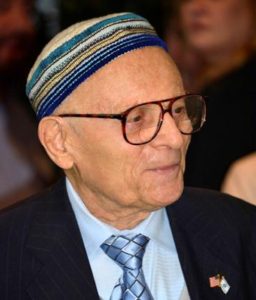 Dr. Eisenbach will be the special Yom Hashoah guest speaker at the 2017 Holocaust Remembrance on Sunday, April 23rd at 7 p.m. at the First Presbyterian Church in Cedar Rapids, Iowa. The event is sponsored by the David and Joan Thaler Holocaust Memorial Fund.
Dr. Eisenbach will be the special Yom Hashoah guest speaker at the 2017 Holocaust Remembrance on Sunday, April 23rd at 7 p.m. at the First Presbyterian Church in Cedar Rapids, Iowa. The event is sponsored by the David and Joan Thaler Holocaust Memorial Fund.
See our events listings for other area speaking engagements.
Jacob Eisenbach was born in Poland in 1923. Nicknamed “Kuba” by his father, Eisenbach grew up in a loving household with all of the hopes and dreams of any family… he was to be a doctor, his brother Sam, an author… his sister dreamed of a career as a pharmacist. That all changed when Hitler’s army invaded Poland in 1939.
The Jewish ghetto in Eisenbach’s hometown of Lodz became a fenced prison camp. The family was torn apart. His mother died before the invasion, his father in a forced labor camp, his brother Henry at Auschwitz at age eleven. His sister was killed by machine gun fire in the city of Lwow, where Nazis killed over 100,000 jews in three days. Only Jacob and his brother Sam were left alive, hiding out and fending for themselves.
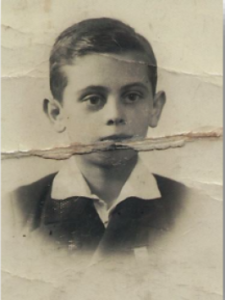
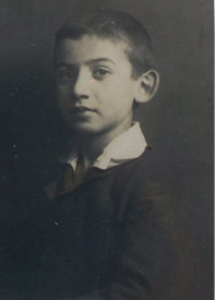 Sam and Jacob were eventually captured and taken to a work camp in Skarzysko, Poland, where they were forced to work in a munition factory. They were later moved to a second munitions factory, where Jacob met a young woman, Irene, who was to become the love of his life. Amidst the horror and oppression, love bloomed. “I tell students, We have every reason to be angry. We have every reason to give up on humanity. But we cannot give up on humanity,” says Eisenbach. Sadly, Sam survived the war only to be murdered by an anti-Semite two years after the end of the war.
Sam and Jacob were eventually captured and taken to a work camp in Skarzysko, Poland, where they were forced to work in a munition factory. They were later moved to a second munitions factory, where Jacob met a young woman, Irene, who was to become the love of his life. Amidst the horror and oppression, love bloomed. “I tell students, We have every reason to be angry. We have every reason to give up on humanity. But we cannot give up on humanity,” says Eisenbach. Sadly, Sam survived the war only to be murdered by an anti-Semite two years after the end of the war.
After surviving the war, Jacob and Irene moved to Germany where he studied dentistry, becoming a doctor as his father had dreamed. They later immigrated to the U.S. and settled in Cedar Rapids, where they had three sons, and Dr. Eisenbach set up practice. During their time in Cedar Rapids, he served a term as Temple Judah’s Board President. “Moving to Cedar Rapids, I was living in one of the finest cities if its size in the country. Our three sons grew up there. The people of Cedar Rapids are wonderful, great Americans. Cedar Rapids quickly became our home.”
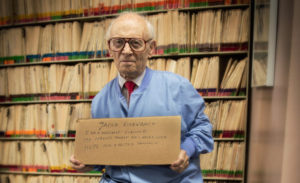 In the early 1970s, Jacob and Irene moved to California and he set up a dental practice in Anaheim Hills. Irene passed away in 2013, but Jacob continued to practice dentistry until last year when he retired at the age of 93. “If I face a stressful situation, I stop and think for a moment about my experience under the Nazis. It doesn’t begin to compare,” he told the Orange County Register. “I consider myself to be very lucky,”
In the early 1970s, Jacob and Irene moved to California and he set up a dental practice in Anaheim Hills. Irene passed away in 2013, but Jacob continued to practice dentistry until last year when he retired at the age of 93. “If I face a stressful situation, I stop and think for a moment about my experience under the Nazis. It doesn’t begin to compare,” he told the Orange County Register. “I consider myself to be very lucky,”
His devoted patients continue to think of him fondly, even after retirement. Among the Amazon reviews of his biography, one reader writes: “Dr. Eisenbach has been my dentist for over 30 years, and I am saddened that he has just retired at the age of 92. This man is as sharp as a tack, and to read about his history is just amazing. I would recommend this book to anyone who has an interest in history, especially the internment camps the Jews were subjected to in WWII. His story is amazing and an inspiration to everyone that you can survive and succeed.”
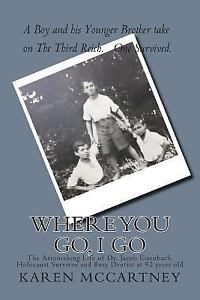 Dr. Eisenbach shares these life lessons:
Dr. Eisenbach shares these life lessons:
- No matter how dark the clouds may be, there will always be a day when the sun breaks through. Never lose hope for a better tomorrow. It has happened to me many times.
- Do not accept ideas of hatred, discrimination, and intolerance. It is those ideas that lead to the Holocaust, during which six million Jews died.
- Observe the Ten Commandments, which Moses received from God.
- Live by the American and Judeo-Christian philosophy of life.
- Do what you can to prevent and eliminate Genocide.
And he encourages readers to contact the United States Museum of the Holocaust at 202-488-0400.
article by Rich Dana